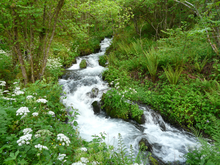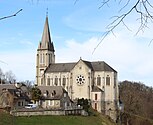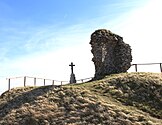Labassère
| Labassère | ||
|---|---|---|

|
|
|
| region | Occitania | |
| Department | Hautes-Pyrénées | |
| Arrondissement | Bagneres-de-Bigorre | |
| Canton | La Haute-Bigorre | |
| Community association | Communes de la Haute-Bigorre | |
| Coordinates | 43 ° 4 ′ N , 0 ° 6 ′ E | |
| height | 546-1,169 m | |
| surface | 10.09 km 2 | |
| Residents | 235 (January 1, 2017) | |
| Population density | 23 inhabitants / km 2 | |
| Post Code | 65200 | |
| INSEE code | 65238 | |
 View of the center of Labassère |
||
Labassère is a French commune with 235 inhabitants (as of January 1, 2017) in the Hautes-Pyrénées department in the Occitanie region (before 2016: Midi-Pyrénées ). The municipality belongs to the arrondissement of Bagnères-de-Bigorre and the canton of La Haute-Bigorre (until 2015: canton of Bagnères-de-Bigorre ).
The inhabitants are called Labassèrois and Labassèroises .

geography
Labassère is located about four kilometers west of Bagnères-de-Bigorre in its catchment area ( Aire urbaine ) in the historic county of Bigorre .
Labassère is surrounded by the six neighboring municipalities:
| Astugue | Trébons | Pouzac |
| Neuilh |

|
|
| Germs-sur-l'Oussouet | Bagneres-de-Bigorre |
The highest point of the municipality is the summit of Pic de Labassère ( 1169 m ) on the southern border with the neighboring municipality of Bagnères-de-Bigorre.
Labassère lies in the catchment area of the Adour River .
The Oussouet, one of its tributaries, forms the natural border with the neighboring municipalities of Astugue, Neuilh and Germs-sur-l'Oussouet to the west.
The Gailleste crosses the territory of the commune in the eastern part together with its tributary, the Ruisseau Peyret, which rises in Labassère.
The Ruisseau Marrosque also rises in Labassère and flows into the Oussouet on the border with the neighboring municipality of Germs-sur-l'Oussouet.
Toponymy
The Occitan name of the municipality is Labassèra. It has its origins in the Gascognischen labassèra ( German schieferbruch ), a derivation from labassa ( German slate ) and labasso ( German stone slab ) together with the suffix -ariam . The map of Cassini of 1750 has already entered a slate quarry. The nickname of the residents of the community is consequently Eths losèrs ( German for the slate breakers ).
Toponyms and mentions of Labassère were:
- Labassere (1285 and 1312, census of the nobility in Bigorre or the copial book of the Viscounts of Lavedan , called Livre vert de Bénac ),
- Labasera (1300, elevation in Bigorre),
- Labacere (1312, Livre vert de Bénac ),
- De Basseria (1313, Debita regi Navarre tax list ),
- La Bassera (1326 and 1342, Livre vert de Bénac or parish register of Tarbes ),
- La Bascere (1384, Livre vert de Bénac ),
- La Bassera (1429, Bigorre county census list),
- Labassere (1750 and 1793, map by Cassini or Notice Communale ),
- La Bassère (1801, Bulletin des lois ).
Population development
After records began, the population rose to a peak of around 790 by the beginning of the 20th century. In the following period, the size of the community fell to around 220 inhabitants during short recovery phases up to the 1990s, before a relatively short growth phase up to the first decade the 21st century, and the number of inhabitants has been falling again since then.
| year | 1962 | 1968 | 1975 | 1982 | 1990 | 1999 | 2006 | 2011 | 2017 |
|---|---|---|---|---|---|---|---|---|---|
| Residents | 396 | 331 | 241 | 220 | 218 | 235 | 258 | 255 | 235 |
Attractions
- Parish Church of Saint Martin. The Gothic style church was rebuilt in 1898 because the previous building had become too small due to the growing community.
- Donjon de Labassère, remnant of a keep of a former castle, once called optical telegraph station was used.
- Labassère's sulphurous spring discovered in 1800 by the parish priest Pédefer.
Economy and Infrastructure
Labassère is located in the AOC zones of the Porc noir de Bigorre pig breed and the Jambon noir de Bigorre ham .

total = 28
traffic
Labassère can be reached from Route départementale 88 and local roads that branch off from Route départementale 18.
Personalities
- During a visit to his new parish, Pastor Jacques Pédefer discovered the spring from the smell of sulfur. Analyzes showed a high sulfur content in the water, which was subsequently used for the treatment of bronchial diseases and tuberculosis . The water was bottled, transported by mules to Bagnères-de-Bigorre and sold there. This operation was closed in 1991.
- Alphonse Grasset, born on October 17, 1873 in Labassère, died on November 20, 1952 in Bagnères-de-Bigorre, was a military man and author of military publications.
Web links
Individual evidence
- ↑ Hautes-Pyrénées ( fr ) habitants.fr. Retrieved November 19, 2019.
- ↑ Aire urbaine de Bagnères-de-Bigorre (300) ( fr ) INSEE . Retrieved November 19, 2019.
- ↑ Ma commune: Labassère ( fr ) Système d'Information sur l'Eau du Bassin Adour Garonne. Retrieved November 19, 2019.
- ↑ Labassère ( fr ) Hautes-Pyrénées department. Retrieved November 19, 2019.
- ^ David Rumsey Historical Map Collection France 1750 ( en ) David Rumsey Map Collection: Cartography Associates. Retrieved November 19, 2019.
- ↑ a b Notice Communale Labassère ( fr ) EHESS . Retrieved November 19, 2019.
- ↑ Populations légales 2016 Commune de Labassère (65238) ( fr ) INSEE . Retrieved November 19, 2019.
- ↑ Les monuments historiques du village ( fr ) Académie de Toulouse . Retrieved November 19, 2019.
- ↑ Institut national de l'origine et de la qualité: Rechercher un produit ( fr ) Institut national de l'origine et de la qualité . Retrieved November 19, 2019.
- ↑ Caractéristiques des établissements en 2015 Commune de Labassère (65238) ( fr ) INSEE . Retrieved November 19, 2019.
- ↑ La source sulfureuse de Labassère ( fr ) Académie de Toulouse . Retrieved November 19, 2019.
- ↑ Alphonse Grasset (1873-1952) . Bibliothèque nationale de France . Retrieved November 19, 2019.







